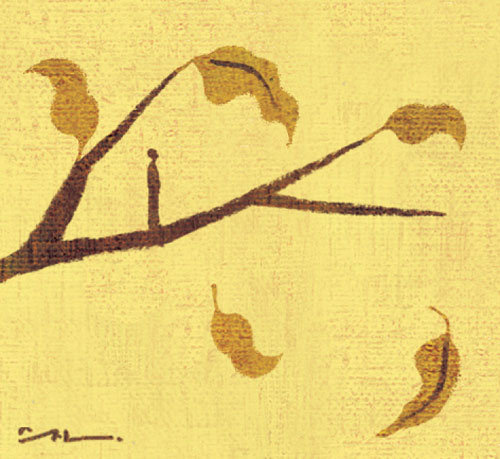Autumn thoughts
Autumn thoughts
Posted October. 22, 2021 07:31,
Updated October. 22, 2021 07:31

A restrained expression of language even suppresses emotional arousal. Only chains of adjectives and nouns weave beads of dried sceneries with a slight depth of bleakness. A closer look at how nouns are arranged and what adjectives of the author’s choice imply may help you vaguely portray what the speaker of the poem has on his mind on every step taken. The finishing touches are put on the last phrase – “The one filled with longings lies at the opposite end of the skies,” which may be a truly and deeply expressed line that has just come out of his soul after making its way through layers of self-restraint. This phrase begs the question of whether it comes from longings that overflow against a backdrop of a lonely night in autumn or is another expression of nostalgia felt by a traveler far from home.
Here is a poem written by Emperor Yang of the Sui dynasty of old China titled “Staring at the Field.” “Flocks of crows growing in winter, flows of water winding through a remote village. Just a few inches away sundown, tides of loneliness only rising.”
Chinese poet Ma Zhiyuan makes a bold poetic transformation to this piece by streamlining predicates. He focuses on the beauty of a piece refreshed and reborn from the original.
This poem is categorized as part of the shanqu, or a genre of verse in the Yuan Dynasty, which was derived from the ci - a famous genre in vogue during the Song Dynasty. “Tian Jing Sha,” the name of a melody meaning "Autumn Thoughts” right next to the title of the song, defines a style.
The Mongols ruled central districts of China in the Yuan Dynasty, which they were treated as the mainstream, while the Han Tribe was ill-treated as the third class (the northern race) and the fourth class (the southern race). As days were gone when poetic talent and writing skills were the basis for power, comedies gained dominance over classic poetry and prose while the shanqu turned from an independent field of literature into an essential element as part of a comedy just as an aria in an opera show.
Headline News
- Joint investigation headquarters asks Yoon to appear at the investigation office
- KDIC colonel: Cable ties and hoods to control NEC staff were prepared
- Results of real estate development diverged by accessibility to Gangnam
- New budget proposal reflecting Trump’s demand rejected
- Son Heung-min scores winning corner kick







